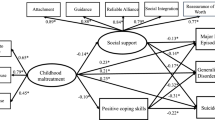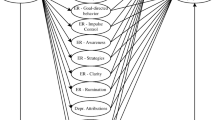Abstract
Background
While important links have been described between childhood abuse and propensity to develop depressive disorders in adult life, less is known about mechanisms, such as identity and shame, that may contribute to this relationship and the effects of age.
Objective
We examined the association between perceived childhood abuse and depressive symptoms––with age as a potential moderating variable––and including dysfunctional identity and shame as mediators of this relation.
Methods
This cross-sectional correlational study recruited 393 participants through the Prolific Academic platform. Average age was 34.26 (SD = 12.67; range = 18–75); 69.5% identified as women, 29% as men, and 1.3% as non-binary gender. Validated scales assessed childhood abuse history (abuse subscale of the Measure of Parental Style), identity dysfunction (self-Concept and Identity Measure), shame (abbreviated version of the Personal Feelings Questionnaire-2) and depressive symptoms (Patient Health Questionnaire-8). Linear regression was used to examine moderation effects, and conditional process modelling, combining moderation with parallel mediation effects.
Results
Age moderated the childhood abuse-depressive symptom relationship F(3, 389) = 28.595, R2 = .181, p < .001, most significantly for individuals younger than 49. Identity dysfunction and shame mediated the abuse-depression association, moderated by age; F(3, 389) = 33.045, R2 = .203, p < .001; F(4, 389) = 67.151, R2 = .409, p < .001, respectively. Both parallel and sequential mediation effects were significant among younger adults.
Conclusions
Childhood abuse may be linked with depressive symptom severity among young adults through mechanisms of identity dysfunction and generalized shame––both in parallel and sequentially. This finding suggests possibilities for targeting identity and shame in clinical interventions among young adults with histories of childhood abuse.


Similar content being viewed by others
Data availability
The datasets generated during and/or analyzed during the current study are available from the corresponding author on reasonable request.
References
Bennett, D. S., Sullivan, M. W., & Lewis, M. (2010). Neglected children, shame-proneness, and depressive symptoms. Child Maltreat, 15(4), 305–314. https://doi.org/10.1177/1077559510379634
Berman, S. L. (2016). Identity and Trauma. Journal of Traumatic Stress Disorders & Treatment, 5(2). https://doi.org/10.4172/2324-8947.1000e108
Berman, S. L., Montgomery, M. J., & Ratner, K. (2020). Trauma and identity: A reciprocal relationship? Journal of Adolescence, 79, 275–278. https://doi.org/10.1016/j.adolescence.2020.01.018
Bernet, C. Z., & Stein, M. B. (1999). Relationship of childhood maltreatment to the onset and course of major depression in adulthood. Depress Anxiety, 9(4), 169–174.
Braithwaite, E. C., O’Connor, R. M., Degli-Esposti, M., Luke, N., & Bowes, L. (2017). Modifiable predictors of depression following childhood maltreatment: a systematic review and meta-analysis. Translational Psychiatry, 7(7), e1162. https://doi.org/10.1038/tp.2017.140
Budiarto, Y., & Helmi, A. F. (2021). Shame and Self-Esteem: A Meta-Analysis. Europe’s Journal of Psychology, 17(2), 131–145. https://doi.org/10.5964/ejop.2115
Carlson, E. B., Furby, L., Armstrong, J., & Shlaes, J. (1997). A conceptual framework for the long-term psychological effects of traumatic childhood abuse. Child Maltreatment, 2(3), 272–295.
Curran, T., & Wexler, L. (2017). School-Based Positive Youth Development: A Systematic Review of the Literature. Journal of School Health, 87(1), 71–80. https://doi.org/10.1111/josh.12467
Dube, S. R., Anda, R. F., Felitti, V. J., Chapman, D. P., Williamson, D. F., & Giles, W. H. (2001). Childhood abuse, household dysfunction, and the risk of attempted suicide throughout the life span: findings from the Adverse Childhood Experiences Study. JAMA, 286(24), 3089–3096. https://doi.org/10.1001/jama.286.24.3089
Dube, S. R., Felitti, V. J., Dong, M., Giles, W. H., & Anda, R. F. (2003). The impact of adverse childhood experiences on health problems: evidence from four birth cohorts dating back to 1900. Preventive Medicine, 37(3), 268–277. https://doi.org/10.1016/s0091-7435(03)00123-3
Gilbert, P. (2007). The evolution of shame as a marker for relationship security. In J. L. Tracy, Robins, R. W., Tangley, J. P. (Ed.), The Self-Conscious Emotions: Theory and Research (pp. 283–309). Guilford.
Harder, D. H., & Zalma, A. (1990). Two promising shame and guilt scales: a construct validity comparison. Journal of Personality Assessment, 55(34), 729–745. https://doi.org/10.1080/00223891.1990.9674108
Hayes, A. F. (2018). Introduction to mediation, moderation, and conditional process analysis : a regression-based approach (Second (edition). Guilford Press.
Karpman, M. B. (1983). The Johnson-Neyman Technique Using SPSS or BMDP. Educational and Psychological Measurement, 43, 137–147.
Kaufman, E. A., Montgomery, M. J., & Crowell, S. E. (2014). Identity-Related Dysfunction: Integrating Clinical and Developmental Perspectives. Identity, 14, 297–311.
Kaufman, E. A., Montgomery, M. J., & Crowell, S. E. (2015). The development, factor structure, and validation of the Self-concept and Identity Measure (SCIM): A self-report assessment of clinical identity disturbance. Journal of Psychopathology and Behavioral Assessment., 37, 122–133.
Kaufman, E. A., Puzia, M. E., Crowell, S. E., & Price, C. J. (2019). Replication of the Self-Concept and Identity Measure (SCIM) Among a Treatment-Seeking Sample. Identity (mahwah, N j), 19(1), 18–28. https://doi.org/10.1080/15283488.2019.1566068
Kealy, D., Hewitt, P. L., Cox, D. W., & Laverdière, O. (2023). Narcissistic vulnerability and the need for belonging: Moderated mediation from perceived parental responsiveness to depressive symptoms. Current Psychology, 42, 2820–2826.
Kessler, R. C., McLaughlin, K. A., Green, J. G., Gruber, M. J., Sampson, N. A., Zaslavsky, A. M., Aguilar-Gaxiola, S., Alhamzawi, A. O., Alonso, J., Angermeyer, M., Benjet, C., Bromet, E., Chatterji, S., de Girolamo, G., Demyttenaere, K., Fayyad, J., Florescu, S., Gal, G., Gureje, O., … Williams, D. R. (2010). Childhood adversities and adult psychopathology in the WHO World Mental Health Surveys. Br J Psychiatry, 197(5), 378–385. https://doi.org/10.1192/bjp.bp.110.080499
Klein, D. N., Arnow, B. A., Barkin, J. L., Dowling, F., Kocsis, J. H., Leon, A. C., Manber, R., Rothbaum, B. O., Trivedi, M. H., & Wisniewski, S. R. (2009). Early adversity in chronic depression: Clinical correlates and response to pharmacotherapy. Depression and Anxiety, 26(8), 701–710. https://doi.org/10.1002/da.20577
Kroenke, K., Strine, T. W., Spitzer, R. L., Williams, J. B., Berry, J. T., & Mokdad, A. H. (2009). The PHQ-8 as a measure of current depression in the general population. Journal of Affective Disorders, 114(1–3), 163–173. https://doi.org/10.1016/j.jad.2008.06.026
Kroger, J., & Marcia, J. E. (2011). The identity statuses: Origins, meanings, and interpretations In S. J. Schwartz, K. Luyckx, & V. L. Vignoles (Eds.), Handbook of identity theory and research (Vol. 1, pp. 31–53). Springer.
Laurenssen, E. M., Hutsebaut, J., Feenstra, D. J., Bales, D. L., Noom, M. J., Busschbach, J. J., Verheul, R., & Luyten, P. (2014). Feasibility of mentalization-based treatment for adolescents with borderline symptoms: a pilot study. Psychotherapy (Chic), 51(1), 159–166. https://doi.org/10.1037/a0033513
Lind, M., Vanwoerden, S., Penner, F., & Sharp, C. (2020). Narrative Coherence in Adolescence: Relations With Attachment, Mentalization, and Psychopathology. Journal of Personality Assessment, 102(3), 380–389. https://doi.org/10.1080/00223891.2019.1574805
Liu, R. T. (2017). Childhood Adversities and Depression in Adulthood: Current Findings and Future Directions. Clinical Psychology: Science and Practice (New York), 24(2), 140–153. https://doi.org/10.1111/cpsp.12190
Liu, Q. Q., & Hu, Y. T. (2020). Self-compassion mediates and moderates the association between harsh parenting and depressive symptoms in Chinese adolescent. Current Psychology, 42, 16036–16048.
Lynch, K. S., & Lachman, M. E. (2020). The Effects of Lifetime Trauma Exposure on Cognitive Functioning in Midlife. Journal of Traumatic Stress, 33(5), 773–782. https://doi.org/10.1002/jts.22522
Macfie, J., Cicchetti, D., & Toth, S. L. (2001). The development of dissociation in maltreated preschool-aged children. Development and Psychopathology, 13(2), 233–254. https://doi.org/10.1017/s0954579401002036
Maschi, T., Viola, D., & Morgen, K. (2014). Unraveling trauma and stress, coping resources, and mental well-being among older adults in prison: empirical evidence linking theory and practice. Gerontologist, 54(5), 857–867. https://doi.org/10.1093/geront/gnt069
Miceli, M., & Castelfranchi, C. (2018). Reconsidering the Differences Between Shame and Guilt. Europe’s Journal of Psychology, 14(3), 710–733. https://doi.org/10.5964/ejop.v14i3.1564
Morrison, A. (1989). Shame: The underside of narcissism. Analytic Press.
Nikolic, M., Hannigan, L. J., Krebs, G., Sterne, A., Gregory, A. M., & Eley, T. C. (2022). Aetiology of shame and its association with adolescent depression and anxiety: results from a prospective twin and sibling study. Journal of Child Psychology and Psychiatry, 63(1), 99–108. https://doi.org/10.1111/jcpp.13465
Parker, G., Roussos, J., Hadzi-Pavlovic, D., Mitchell, P., Wilhelm, K., & Austin, M. P. (1997). The development of a refined measure of dysfunctional parenting and assessment of its relevance in patients with affective disorders. Psychological Medicine, 27(5), 1193–1203. https://doi.org/10.1017/s003329179700545x
Rice, S. M., Kealy, D., Treeby, M. S., Ferlatte, O., Oliffe, J. L., & Ogrodniczuk, J. S. (2018). Male guilt—and shame-proneness: The Personal Feelings Questionnaire (PFQ-2 Brief). Archives of Psychiatry and Psychotherapy, 20, 46–54.
Rollins, E. M., & Crandall, A. (2021). Self-Regulation and Shame as Mediators Between Childhood Experiences and Young Adult Health. Front Psychiatry, 12, 649911. https://doi.org/10.3389/fpsyt.2021.649911
Rubin, K. H., Coplan, R. J., & Bowker, J. C. (2009). Social withdrawal in childhood. Annual Review of Psychology, 60, 141–171. https://doi.org/10.1146/annurev.psych.60.110707.163642
Schwartz, S. J., & Petrova, M. (2018). Fostering healthy identity development in adolescence. Nature Human Behaviour, 2(2), 110.
Stuewig, J., & McCloskey, L. A. (2005). The relation of child maltreatment to shame and guilt among adolescents: psychological routes to depression and delinquency. Child Maltreat, 10(4), 324–336. https://doi.org/10.1177/1077559505279308
Tangney, J. P., & Dearing, R. L. (2002). Assessing shame and guilt. In J. P. Tangney, & R. L. Dearinng (Eds.), Shame and guilt (pp. 27–51.). Guilford Press.
Uliaszek, A. A., Fournier, M. A., Southward, M. W., Al-Dajani, N., & Quitasol, M. (2021). Bridging development and disturbance: A translational approach to the study of identity. Personal Disord. https://doi.org/10.1037/per0000514
Westen, D., Betan, E., & Defife, J. A. (2011). Identity disturbance in adolescence: associations with borderline personality disorder. Development and Psychopathology, 23(1), 305–313. https://doi.org/10.1017/S0954579410000817
Widom, C. S., DuMont, K., & Czaja, S. J. (2007). A prospective investigation of major depressive disorder and comorbidity in abused and neglected children grown up. Archives of General Psychiatry, 64(1), 49–56. https://doi.org/10.1001/archpsyc.64.1.49
Wilson, J. P., Drozdek, B., & Turkovic, S. (2006). Posttraumatic shame and guilt. Trauma Violence Abuse, 7(2), 122–141. https://doi.org/10.1177/1524838005285914
Wong, A. E., Dirghangi, S. R., & Hart, S. H. (2019). Self-concept clarity mediates the effects of adverse childhood experiences on adult suicide behavior, depression, loneliness, perceived stress, and life distress. Self and Identity, 18, 247–266.
Ye, Z., Wei, X., Zhang, J., Li, H., & Cao, J. (2023). The impact of adverse childhood experiences on depression: The role of insecure attachment styles and emotion dysregulation strategies. Current Psychology. https://doi.org/10.1007/s12144-023-04613-1
Acknowledgements
We wish to thank all study participants and the Michael Smith Foundation for Health Research for providing funding for our study.
Funding
This work was supported by funding from the Michael Smith Foundation for Health Research, Scholar Award #18317, awarded to Dr. David Kealy.
Author information
Authors and Affiliations
Contributions
Dr. David Kealy contributed to the study conception and design, while both authors contributed to material preparation, data collection and analysis, as well as manuscript preparation and approved the final manuscript.
Corresponding author
Ethics declarations
Ethics approval
Approval was obtained from the University of British Columbia Behavioural Research Ethics Board. The procedures used in this study adhere to the tenets of the Declaration of Helsinki.
Informed consent
Informed consent was obtained from all individual participants included in the study.
Competing interests
Dr. David Kealy received funding from the Michael Smith Foundation for Health Research, while Dr. Laura E. Labonté has no financial interests to disclose. Neither authors have non-financial interests to disclose.
Additional information
Publisher's note
Springer Nature remains neutral with regard to jurisdictional claims in published maps and institutional affiliations.
Rights and permissions
Springer Nature or its licensor (e.g. a society or other partner) holds exclusive rights to this article under a publishing agreement with the author(s) or other rightsholder(s); author self-archiving of the accepted manuscript version of this article is solely governed by the terms of such publishing agreement and applicable law.
About this article
Cite this article
Labonté, L.E., Kealy, D. Linking childhood maltreatment and depressive symptoms: identity, shame, and age effects. Curr Psychol 43, 11904–11913 (2024). https://doi.org/10.1007/s12144-023-05274-w
Accepted:
Published:
Issue Date:
DOI: https://doi.org/10.1007/s12144-023-05274-w




